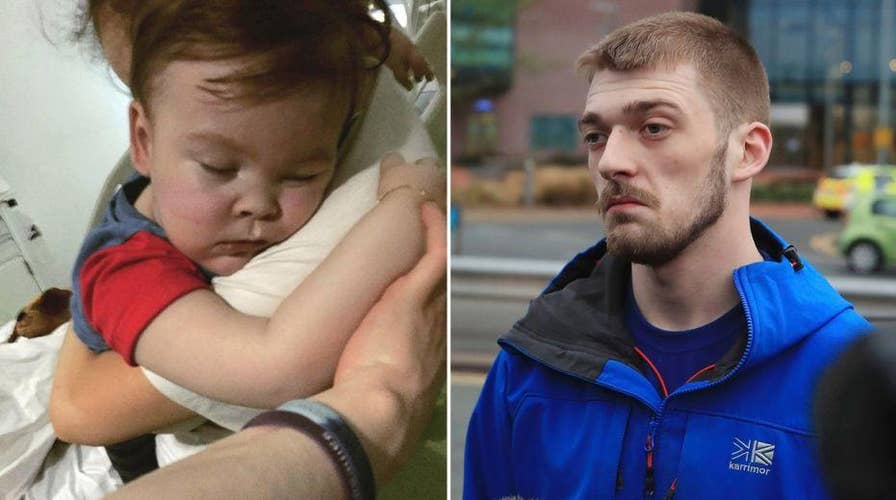Alfie Evans’ fight for survival: Parents give mouth-to-mouth
Parents of Alfie Evans have been embroiled in a lengthy battle over medical treatment for their 23-month-old son who is suffering from an unknown degenerative brain condition. Now Evans' parents are giving him mouth-to-mouth resuscitation in a desperate bid to keep him alive.
More than a year after being admitted to a British hospital and afflicted with a still-undiagnosed neurological ailment, Baby Alfie Evans is being killed by court order. His case defies all logic, and it brings me back to my experiences at the bedside of two other people who faced the same kind of injustice.
Among the most profound moments of my life and ministry was being at the bedside of Terri Schindler Schiavo as she was dehydrated and starved to death by court order in Florida in 2005. Only a short list of people, approved by the family and the court, could even enter her room. I was among them.
I have written before about the armed police officers who stood around Terri’s bed and at the door of her room to make sure no one slipped her a sip of water to ease her suffering as she lay dying of thirst. But right next to her head was a vase of flowers, lush and bursting with color as they soaked up the water in the vase. It was absurd.
Terri’s death was neither quick nor painless. It took nearly two weeks, her family standing by, ensnared in a nightmare that not even the most sadistic mind could have contrived. We saw her face, locked in an expression of horrified sadness, as she dehydrated to death, and it’s an image that will live in my memory forever. So will the image of the flowers.
While the hospital has once again begun feeding Baby Alfie, there is no guarantee it will to continue. To imagine what happened to Terri Schiavo being experienced by this precious 23-month-old child is more than many of us can bear. And as with Terri Schiavo, the overall disregard the hospital has shown him is outrageously unfair and completely unnecessary.
Tom Evans and Kate James, Alfie’s parents, don’t want anything from England, or Alder Hey Hospital, other than to be allowed to wrap their arms around their precious child and carry him out of the hospital where he has been a patient since December 2016. An ambulance is waiting outside to take him to a medical jet, which will fly him to Bambino Gesu Hospital in Rome, where life is sacred and bursting with possibility. Pope Francis supports this move. The Italian government has granted Baby Alfie citizenship.
But doctors and judges won’t let Baby Alfie’s parents exercise the right that is already theirs. Terri Schiavo’s parents were deprived of that right as well, because her husband wanted her to die. But in Baby Alfie’s case, the family is united. His parents should be the final authority in deciding about his care, not the doctors who say his treatment is futile, nor the judges who can’t seem to see beyond their hallowed halls.
Baby Alfie’s parents -- at 20 and 21, wise beyond their years – reached out to me in this case for help. They understand that the mysterious and as-yet-undiagnosed illness afflicting their son might well claim his life, but they are willing take the chance that a treatment might yet be discovered. And they understand there might be no such treatment.
This is not unlike the situation of another couple who also reached out to me about their baby boy back in 2011. Moe and Sana Maraachli’s child, who came to be known around the world as Baby Joseph, was in a hospital in London, Ontario, suffering from the same illness that claimed the life of their older child. They knew Baby Joseph would succumb as well, but they wanted him to have the basic care he needed – starting with a simple tracheotomy. But the hospital refused to provide it.
With the help of Priests for Life and many others, the hospital finally agreed to let him go. An air ambulance was donated by Kalitta MedFlight, and I flew to Ontario to meet Baby Joseph and his dad. A midnight flight took the three of us to Cardinal Glennon Children’s Hospital in St. Louis. Baby Joseph got the care he needed in St. Louis, and once he was able to breathe stably on his own, was allowed to go home where he lived for another six months with his loving parents and brother.
If Alder Hey Hospital has its way, Baby Alfie will die in a hospital unwilling to treat him or to let others do so. No one, not even the medical staff or the judges who ruled against every appeal, can expect these parents will ever be the same after standing by helpless as their son was murdered by court order.
None of us will ever be quite the same. Nor should we. Whether it approaches naturally or unnaturally, we can sometimes break the advance of death, and other times not. But we can always break the silence.





















